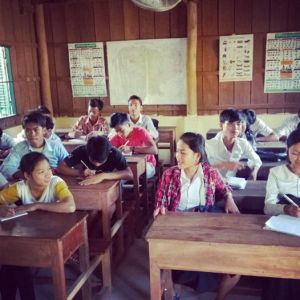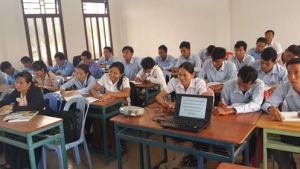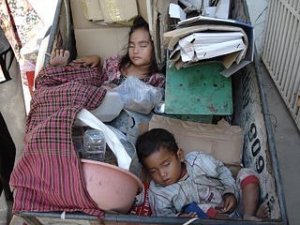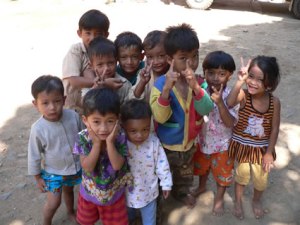This week I want to talk about a topic that I care a lot about. The education system in Cambodia. Yesterday Chanthou asked me to help her with her English homework for university. It was a text that she had to translate and couldn’t understand. It was so full of mistakes, it made my stomach turn. I asked Chanthou where she got the text from and she said her teacher had written it himself. Just to give you an idea about it, here are some sentences:”Strong as lion, like eagle, like tiger you be and reach the horizon.”, “Like mother of yours able bear hard, painful sorrow when she give birth to you, do the same, hard challenge in life mean get the success.” and “Don’t walk with your friends, they have boyfriend, play the facebook, go out to drink from beer. Walk alone, walk to your good thought and to your hard work alone.” I was thinking by myself, that it was really no surprise that she couldn’t translate it. That is exactly the reason, why the children live under such an intense pressure. Additonally there is no way they could learn English, reading a text like this. The truth is, that children are either caught up in this system, studying and trying their best or fail and stop caring at all. Because of that I try to get them to read, sing and act in English. To show the children that learning should not be combined with constant threat and horror. I honestly only began to learn English, when I finally got an English teacher that made me love going into the lessons instead of filling my head with complicated grammar rules that I was about to forget sooner or later. One of my students said to me, he always dreamed about going on a field trip with school, but this is of course not possible. Just as they are not doing any experiments, group work, presentations… all kind of things that make students become interested in a topic and offer social skills that are needed for later life. Schools have no libraries, the classrooms are filled with way to many students and subjects like art or music are not even on the course schedule.
Every time I ask my students what they have planned for the weekend, they tell me that they are going to study part-time. I never heard of this expression before I came to Cambodia, but since then I happen to hear it nearly every day. After some time had passed, I noted it even as being the children’s most “popular” free time activity. They are going back to school, after they finished school, even on Sunday, and study the things that they should have learned in the actual lessons. One might think they only study the subjects that they have difficulties in, like some kind of tutoring, but this is not the case at all. Whenever I ask my students what they like to do for fun, what their hobbies are, they tell me they either study or do housework. Sounds like a quite depressing childhood, doesn’t it? One might ask now why they spend all their time doing things Western children need to be threatened to do. The answer lies in the depths of Cambodia’s broken and corrupt government. Teachers are never getting paid enough, what leads to them coming late for the lessons, because everyone has about three jobs besides teaching. Sometimes they don’t show up to class at all. One of my students told me she would love to play some sports, football or volleyball, but the sports teacher maybe comes twice a year – if they are lucky. In the actual classes the children are taught close to nothing, the teachers just don’t care. Their own life is complicated enough, their own children have difficulties. Most of the students have a destined future, before they are even born. They will work in the factories or become farmers. They don’t bother to change their life, their parents don’t bother, the government doesn’t bother, so why should the teachers? The ones that actually want to pass a test, need to study part-time. Extra classes that the teachers offer, besides the regular hours that cost so much, that most parents can’t afford it. In these classes the teachers are providing the information’s about the exams and actually teach – sometimes. This means that the children are hanging around in school all morning and early afternoon, learning close to nothing, just to actually study in the afternoon, when they can afford it, to come home totally exhausted, not able to do homework or review as they need to help in the house. It is a crazy system and the government is doing nothing to stop it. Claiming to be a democratic country, with a government that sells the land of Cambodia’s farmers to Chinese enterprises, a ruling party that occupies every inch of national road number 2 with advertisement for them and a prime minister that is since over 30 years “democratically” elected, sending his opposition leader to prison. Where is the hope for Cambodia’s children, the new nation that has to transform the country into a nation that is actually able to compete on an international level?
This year 80 per cent of Cambodia’s twelve grade students failed their exam. It seems like nobody actually learned, or wasn’t prepared enough, for the most important test in early adulthood. It was surprisingly the first time since the beginning of the Lon Nol era that it wasn’t possible to cheat. Unbelievingly but true, the government had provided intense security measurements to prevent the children form cheating. Policeman were barricading the classrooms, nobody could have a mobile phone, in some classrooms there were cameras installed… After there had been cases of parents throwing rocks with the answers wrapped around stones through the classroom windows in the past years, there suddenly came a wind of change. And it is encouraging! The incredible number of failures showed the government that they have a problem, even bigger than they always suspected and that something needs to change. The universities protested because of their lack of new students and parents of high-ranking political heads claimed their right of corruption. The test was repeated. It was officially announced that it would be the only time and for the next year the students either had to begin to study seriously, or fail. Naturally this should also include the teachers that would have to start actually preparing ALL their students for the exam. It is a small step, but at least there is change. The beginning of the new school year was postponed for a full month, not only for the eleventh graders, but for every single child in Cambodia and the test was repeated. The results were still not sunny, but better. Hopefully this drama made some people realize, that there is something fundamentally wrong with Cambodia’s education system.
I can only quote a girl that I talked with this week. She studies English literature since two years in the local university and her teachers are all talking Khmer. She told me, since she began to study she knows nothing more than since she graduated. This is actually frightening. Another boy that studies history in Phnom Penh said he learns all about the glorious ancient history of the Angkor period, but when it comes to the Khmer Rouge, the “k’mai gra-horm”, the information is denied or hard to find. It’s like a curtain of silence was layer over that period, because nobody wants, or is not allowed to remember. I could begin to talk about all the people that suffer from post traumatic stress disorder and get no support or the important Khmer rouge leaders that just continued working for the government, claiming that their crimes against humanity were only committed to save their own families. But this is another topic that should just show how little knowledge about important topics is actually accessible to the public.
The only way to change Cambodia, to stop poverty and despair, is to educate the children. Like Nelson Mandela said: “Education is the most powerful weapon we have to change this world”. Education is one of the few things, nobody will ever be able to take away from you. It’s a human right. And all of us should stand up for it. There is no freedom until we are equal and no equality as long as there is not a good education for every child on this earth.
There is a very organized business of people selling children from the countryside to the big city. The families have no money and can’t afford to spend the little they have on their children, so they sell them for amounts of around 50 Dollar to Phnom Penh where they begin to work for organized street gangs. They are being taught basic English skills and sent on the streets to beg. They sell flowers or ribbons or postcards. Sometimes they carry little babies on their arms, asking for milk. Never far away is one of the bosses of the organization who is organizing the trade and collecting the money afterwards. At night time the children just run around free, sleep in abandoned houses and search for food. They always return to work the next day, as this is the only routine they know, the only stability in their lives. The organization “Friends” in Phnom Penh tries to get these children off the street. They offer education, a home and food to them. A save environment in which they can grow up. With all their efforts, they managed to get around two per cent of the children off the streets. The reason is, that the children have their gangs, the influence of their peers, their freedom and months and months of a living where nobody told them what to do and how to act. They are wild and have no behaviour, they take drugs, they are mentally and physically abused many times. They are outcasts from society, distrusting and have never experienced love. Some realities are more cruel than other realities. Seeing a crowd of 10 little boys, running bare feet trough the streets of Phnom Penh at day time might not seem concerning, what happens at night time, is something entirely different.
So what can we really do to stop this? First of all, we need to learn. There can be loads of money and smiling ladies in beautiful costumes that open up school buildings, donate books, games and footballs for the children, what happens is, that dependence is created. Like Daniela Papi said: “Buildings don’t teach children, people do.” Before we decide to drop something in a community that we are unfamiliar with, when we actually want to help the people and give them something lasting that makes an impact, we need to learn. So many organizations come into development countries and send volunteers that stay for a short time, building wells or shelters, taking pictures with the children to post them on facebook and instagram before they leave again to their comfortable life. What happens to the things they leave in the community? The people will use them, until eventually something breaks, books get lost or the football has a hole and looses air. Locals won’t go and repair the things, they might not know how to, or they have their own lives to worry about. They instead wait until help comes again and they get new things donated. This is what happened in Africa. So many years of foreign aid completely destroyed the country, organizations came to bring food and water, donating clothes… all these things didn’t last, instead they took the peoples confidence and dignity away and left them begging for more. In my opinion all these countries that “need so urgently help” from the West were once proud nations, full of impressive culture and wonderful traditions, older than we can ever imagine. These people were happy. The globalization and our image of how people have to live brought so much despair and grief to these countries. What is the situation in Africa today? The people are still poor, but on so many levels their independence and the hope of creating a better state that is more fitting for the challenges of the new century, was taken away by the foreign aid. Just like the UN operation in Phnom Penh 1992, that Italian journalist Tiziano Terzani described as “scandalous and immoral” or to give a more drastic examples, Americas disgusting wars beginning in Vietnam that were so absolutely wrong and mindless, they were destined to fail from the very beginning. We are doing it the wrong way. We forget that the people we want to help, are human just as we are. We should look them in the eye, face to face, realize that we are no better than them. We are equal, all of us. And coming into a new country, a new environment, we have to realize that not WE are the ones that should come and teach. Who are we to say that everything we do is better? It was proved so many times, that the opposite is the case. We have unemployment, health-care, poverty, migration and many more issues that we face. Why don’t we start in our own countries, instead of going somewhere else? We need to give the people the possibility to develop themselves, to have own ideas and found their own projects or even better, social enterprises within their community. Because they know how things work, they know about the culture, the climate, the language and many more things that we as people from the outside have no insight on. We think we know everything when we come into a development country and break into the life of innocent people, destroying their world in giving the begging children money or opening up a school, that gives the government an excuse to prevent changes, as the foreigners will take care of it. That’s not the right way. When we come into a new country we learn, learn from the people instead of telling them that they need to learn from us. There are around 5000 NGOs in Cambodia and I don’t want to say that all of them are bad because some are doing a good job, but yet there are so many that are just giving up, changing the lives of the people in a community, making them dependent on foreigners that are offering all these new and shining things, leaving the people insecure and vulnerable after they left.
I was talking with one of my students the day before. He asked me if I wanted to go back to Germany, because I didn’t like Cambodia. I was astonished and told him that the exact opposite was the case. I loved Cambodia and was very sad that I eventually would have to leave. He looked at me with a sad look and asked: “Don’t you know that Cambodia is poor? Have you looked around? This is not a beautiful country.” I asked him if he thought money was beautiful. He looked at me confused, shaking his head. “There are many people in Germany, that have a lot of money.”, I told him. “But this doesn’t mean that they are happy. Sometimes it is all their money that causes them to be sadder than before. You should never forget, that money can’t buy you happiness.” “But in Germany you have everything, everyone there has a house and warm water and electricity.” “This is all true.”, I told him. “But people that have all these things don’t know, that this is something they should actually be happy about.”
Every one of us who wants to help the children, should ask himself if he is really willing to learn. Only then we can follow Gandhis path and be the change we want to see on the world.





